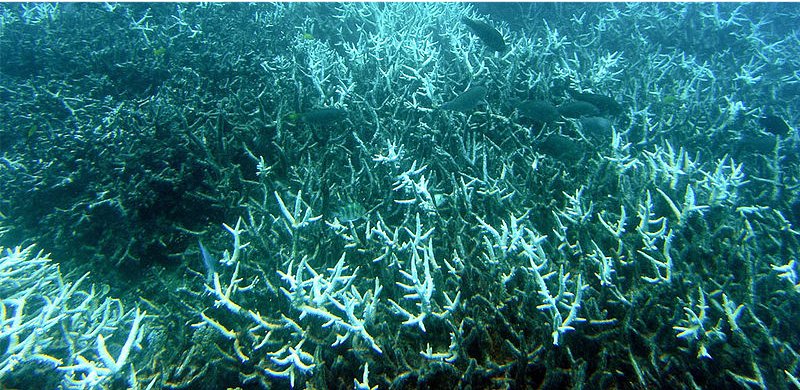
Corals are amazing animals that form reefs which are teeming with life. They eat things that are floating in the water around them, but they also have a mutualistic relationship with algae called “zooxanthellae.” The corals provide the algae with housing, and in exchange, the algae give the corals chemicals they need. It’s a wonderful system that allows both species to flourish.
However, there are times when this system breaks down. When corals become “stressed” (usually by a sudden change in temperature, the intensity of sunlight, pollution levels, etc.), the algae are expelled from the corals. The details of this process are still a mystery, but it usually causes the corals to turn white, as shown in the picture above. Because of that, this process is often called bleaching.
Earlier this year, The New York Times published an article entitled, Global Warming’s Toll on Coral Reefs: As if They’re ‘Ravaged by War.’ It stated:
Large-scale coral bleaching events, in which reefs become extremely fragile, were virtually unheard-of before the 1980s.
That’s the typical “party line” when it comes to those who don’t want to study the issue of global warming seriously. Something bad is happening now, it hardly ever happened in the past, and if we don’t do something about it soon, we are all going to die. Not surprisingly, it just isn’t true.
A recent study examined cores taken from corals in the Great Barrier Reef. These cores exhibit layers, and based on the way corals grow today, they can be interpreted as annual layers. Like counting tree rings, then, you can count coral layers and determine what year the layer formed. While the annual interpretation gets less and less certain the farther you go back in time, it is at least a reasonable way to estimate what was happening to corals in the past.
The authors of the study examined these layers, looking at the year-to-year changes in the rate at which the corals lengthened. Since bleaching events affect coral growth rates, it is reasonable to think that changes in lengthening rates would indicate bleaching events in the past. They used known bleaching events to “calibrate” their analysis, seeing what changes occurred in the cores during observed bleaching events in the past. They then looked at the cores going back almost 300 years.
What the authors found is only surprising to people who read The New York Times and similar sources. They found that coral bleaching events were not at all uncommon throughout the past 300 years, and they were probably more frequent in the past. In fact, they were most frequent in the 1890s and 1740s. The authors also looked at how many corals experienced bleaching in these events. The record was set in the 1850s, with the 1740s, 1670s, and 1690s in a dead heat for second place. Based on their analysis, there is nothing unusual happening currently when it comes to coral bleaching.
It is really common for people to see something unusual happening today and claim that such things are being caused by recent human activity. While that can make for good politics, it makes for lousy science.

Cool study. So they try to use coral for dating?
Also, Wonder what you’d think of this guy?
https://youtu.be/yJmL9hRrpIQ
(Ps.. notice the wiki article on climate change riding under the vid!)
They try to use corals to calibrate carbon dating when tree rings run out, but the uncertainty gets larger and larger the farther back you go, so I don’t find them to be a reliable calibration.
I have never heard of Alex Epstein or Dave Rubin.
Excellent post! Very much fun to read and to learn.
I noticed that the last sentence in the abstract (and a similar one is at the end of the discussion) says “[R]econstructed increases in bleaching frequency _and_ prevalence, may suggest coral populations are reaching an upper bleaching threshold, a “tipping point” beyond which coral survival is uncertain.” Do you think this is just speculation they felt compelled to include, or is it suggested by their data?
I don’t see it in the data.
Man, just one lie after misconstruction of date after misrepresentation of facts after lie. And people wonder why the “fake news” message resonates so well for the President. It feels like you can’t believe anything the media says anymore!